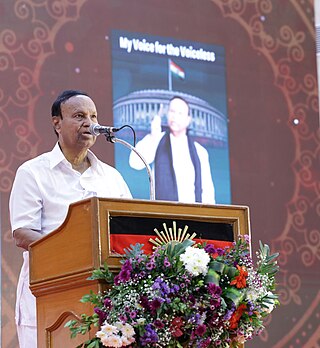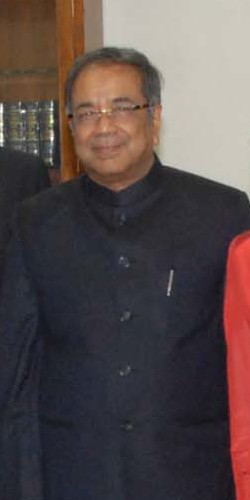Related Research Articles

The prime minister of India is the head of government of the Republic of India. Executive authority is vested in the prime minister and his chosen Council of Ministers, despite the president of India being the nominal head of the executive. The prime minister has to be a member of one of the houses of bicameral Parliament of India, alongside heading the respective house. The prime minister and his cabinet are at all times responsible to the Lok Sabha.

The Rajya Sabha, also known as the Council of States, is the upper house of the bicameral Parliament of India. As of 2023, it has a maximum membership of 250, of which 238 are elected by the legislatures of the states and union territories using single transferable votes through open ballots, while the president can appoint 12 members for their contributions to art, literature, science, and social service. The total allowed capacity is 250 according to article 80 of the Indian Constitution. The current potential seating capacity of the Rajya Sabha is 245, after the Jammu and Kashmir (Reorganisation) Act. The maximum seats of 250 members can be filled up at the discretion and requirements of the house of Rajya Sabha.

The Lok Sabha, also known as the House of the People, is the lower house of India's bicameral Parliament, with the upper house being the Rajya Sabha. Members of the Lok Sabha are elected by an adult universal suffrage and a first-past-the-post system to represent their respective constituencies, and they hold their seats for five years or until the body is dissolved by the President on the advice of the council of ministers. The house meets in the Lok Sabha Chambers of the Parliament House, New Delhi.

The Parliament of India is the supreme legislative body of the Republic of India. It is a bicameral legislature composed of the Rajya Sabha and the Lok Sabha. The President of India, in their role as head of the legislature, has full powers to summon and prorogue either house of Parliament or to dissolve the Lok Sabha, but they can exercise these powers only upon the advice of the Prime Minister and their Union Council of Ministers.

The Government of India is the central executive authority of the Republic of India, a federal republic located in South Asia, consisting of 28 states and eight union territories. The government is led by the prime minister who exercises the most executive power and selects all the other ministers. The country has been governed by a NDA-led government since 2014. The prime minister and their senior ministers belong to the Union Council of Ministers—its executive decision-making committee being the cabinet.

Thalikkottai Rajuthevar Baalu, better known as T. R. Baalu, is an Indian politician. He is currently the MP of Lok Sabha of the Sriperumbudur constituency, elected five times since 1996 from Chennai South and Sriperumbudur. He is a leader of the DMK party and is known for his political loyalty, having been in the party since 1957. He is now the Treasurer of DMK, elected unopposed on 3 September 2020. He earlier served as the Principal Secretary of the DMK Party from August 2018 to January 2020.
Vijay Kumar Malhotra is an Indian politician and a sport administrator. He belongs to the Bharatiya Janata Party.

Indrajit Gupta was an Indian politician who belonged to the Communist Party of India (CPI). From 1996 to 1998, he served as Union Home Minister in the United Front governments of prime ministers H. D. Deve Gowda and I. K. Gujral. That was a dramatic reversal of roles, as the home ministry had, since independence in 1947, banned the CPI thrice, with many of its members, including Gupta, being sent to prison or pushed underground for long stretches. He is to-date the longest-serving member having been elected eleven times to the Lok Sabha, the lower house of Indian Parliament. He suffered his only electoral reverse when he lost to Ashok Krishna Dutt in 1977 after the CPI supported Emergency.

The 13th Lok Sabha is the thirteenth session of the Lok Sabha. It was convened after 1999 Indian general election held during September–October 1999.

The 12th Lok Sabha, was constituted after the 1998 Indian general election held during February–March 1998. This was the second consecutive Lok Sabha, like the 11th Lok Sabha elections that did not provide the country with a stable government. Atal Bihari Vajpayee became the 10th Prime Minister of India but the government lasted for only about thirteen months due to no clear mandate. Also, the party was not able to get support from other parties, after the withdrawal of support by AIADMK. After his resignation, then President K. R. Narayanan asked Sonia Gandhi, the leader of the opposition in the Lok Sabha to form the government; however, Gandhi responded that the UPA would not be able to form a government at the center, following which President Narayanan dissolved the House. The next General elections of 1999 for 13th Lok Sabha provided India a stable government that lasted for full five years. Nine sitting members from Rajya Sabha, the Upper House of Indian Parliament, were elected to 12th Lok Sabha after the 1998 Indian general election.

The 11th Lok Sabha was constituted after April–May 1996 general elections. The result of the election was a hung parliament, which would see three Prime Ministers in two years and force the country back to the polls in 1998. Atal Bihari Vajpayee of Bharatiya Janata Party, the single largest party to win this election, winning 67 more seats than previous 10th Lok Sabha, formed the government which lasted for only 13 days.

Jagmohan Malhotra, known by the mononym Jagmohan, was an Indian civil servant and politician. After working with the Indian National Congress, he joined the Bharatiya Janata Party in 1995. He served as Lieutenant Governor of Delhi and Goa, as the 5th Governor of Jammu and Kashmir, and for three terms as Member of Parliament for New Delhi. In the cabinet, he served as Union Minister for Urban Development and Tourism.

The Government of Uttar Pradesh is the subnational government of the Indian state of Uttar Pradesh with the governor as its appointed constitutional head of the state by the President of India. The Governor of Uttar Pradesh is appointed for a period of five years and appoints the Chief Minister of Uttar Pradesh and their council of ministers, who are vested with the executive powers of the state. The governor remains a ceremonial head of the state, while the chief minister and their council are responsible for day-to-day government functions.

Subhash C. Kashyap is a former secretary-general of 7th Lok Sabha, 8th Lok Sabha and 9th Lok Sabha and Lok Sabha Secretariat from 1984 to 1990. He is also a well known political scientist, an expert in the Indian Constitution, Constitutional Law, Parliamentary Experts and a distinguished scholar. He also headed an International Centre for Parliamentary Documentation, IPU at Geneva till 1983. Kashyap was honorary constitutional advisor to the Government of India on Panchayati Raj Laws and Institutions. He is also recipient of several prestigious awards for the Best Books in Constitution, Law and Political Science. At present Dr. Kashyap is an honorary research professor at the Centre for Policy Research (CPR), New Delhi. He was also a member of the National Commission to Review the Working of Constitution and chairman of its drafting and editorial committee.

T. K. Viswanathan is the Secretary General of the 15th Lok Sabha and Lok Sabha Secretariat, Parliament of India, i.e. the House of the People in the Indian Parliament. As Secretary General, he is also the Administrative head of the Secretariat of the Lok Sabha. The post of Secretary General is of the rank of the Cabinet Secretary in the Government of India, who is the senior most civil servant to the Indian Government. The incumbent to the post is appointed by the Speaker of Lok Sabha in consultation with the Prime Minister of India and the Leader of the Opposition in the Lok Sabha. As per precedence, incumbents to the post of Secretary General have either been senior officers in the Lok Sabha Secretariat or senior civil servants in the Government of India.

Pandit Ram Kishore Shukla was an Indian politician and an activist for Indian independence.
Ram Jeevan Singh is an Indian politician. He was elected to the Lok Sabha, the lower house of the Parliament of India from the Balia in Bihar as a member of the Janata Dal (United).
The Secretary General of the Lok Sabha is the administrative head of the Lok Sabha Secretariat. The secretary general is appointed by the Speaker of the Lok Sabha. The post of secretary general is of the rank of the Cabinet Secretary in the Government of India, who is the senior most civil servant to the Indian government.
Manphool Singh Bhadu was an Indian politician. He was elected to the Lok Sabha, the lower house of the Parliament of India from Bikaner, Rajasthan, as a member of the Indian National Congress.
Imchalemba is an Indian politician from Nagaland. He was elected as the Member of Parliament, Lok Sabha twice, representing the state in the 10th Lok Sabha and 11th Lok Sabha. He was also the founding editor of the defunct newspaper, Nagaland Times.
References
- ↑ Malhotra, G.C (1999). Who's Who 12th Lok Sabha. New Delhi: Lok Sabha Secretariat. pp. 11–12.